LAW00150 Assignment 2: Legal Problems in Business Law, 2019
VerifiedAdded on 2022/09/06
|5
|1537
|19
Homework Assignment
AI Summary
This document presents solutions to a business law assignment, analyzing various legal problems and scenarios. The assignment addresses issues such as breach of contract between siblings, the legality of verbal agreements with police, the enforceability of agreements involving payment for services, the fairness of contract terms, and the application of consumer guarantees. Each problem is dissected to identify key legal issues, relevant rules, and case law, culminating in a reasoned conclusion. The assignment covers a range of legal concepts, including intention to create legal relations, contract formation, consumer rights, and unfair contract terms. The document provides detailed explanations and reasoning for each problem, offering valuable insights into business law principles. It examines cases like Balfour v Balfour, Carlill v Carbolic Smoke Ball Co., and ACCC v JJ Richards, applying legal principles to real-world situations. The solutions provide a comprehensive understanding of business law concepts and their practical application.
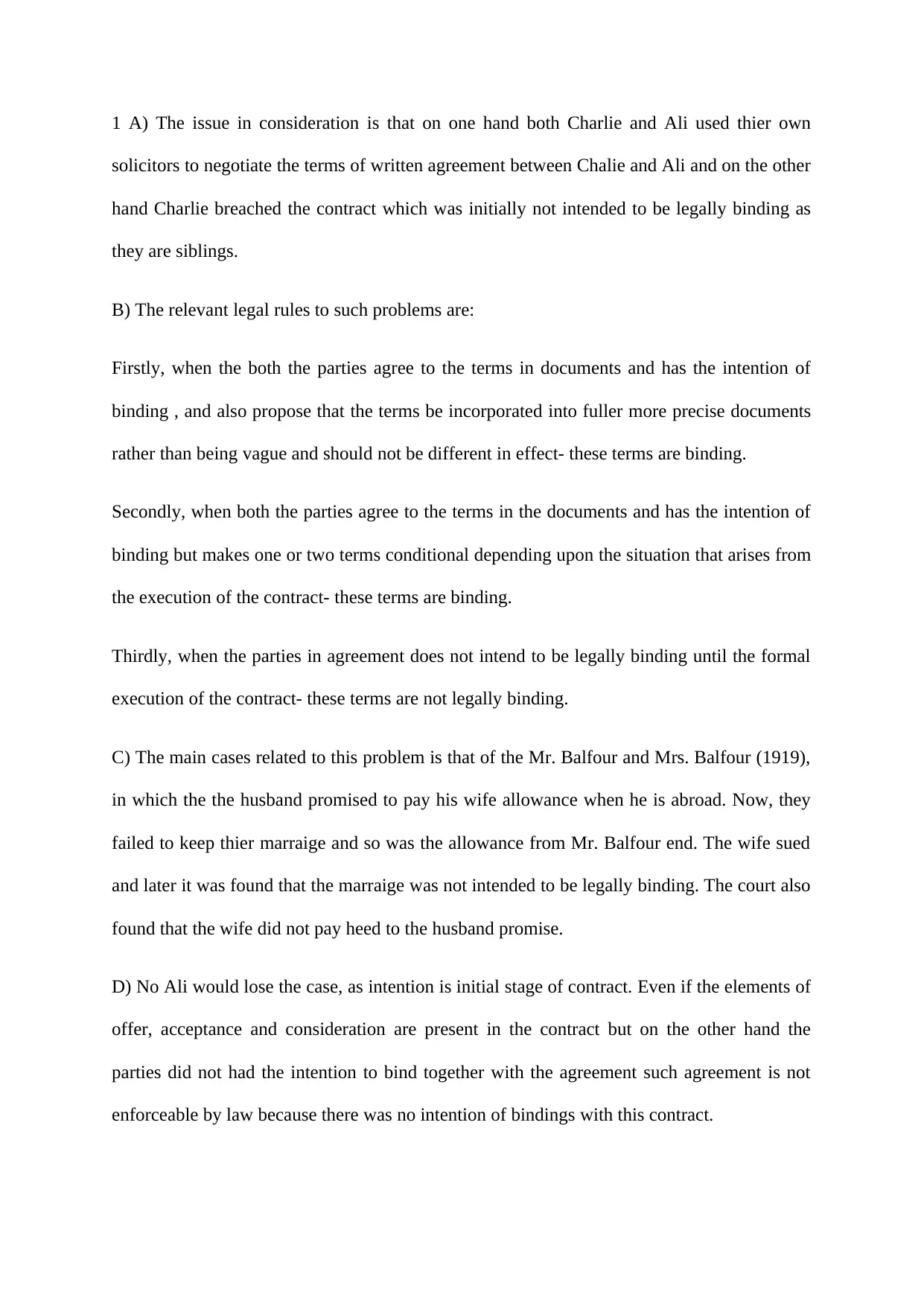
1 A) The issue in consideration is that on one hand both Charlie and Ali used thier own
solicitors to negotiate the terms of written agreement between Chalie and Ali and on the other
hand Charlie breached the contract which was initially not intended to be legally binding as
they are siblings.
B) The relevant legal rules to such problems are:
Firstly, when the both the parties agree to the terms in documents and has the intention of
binding , and also propose that the terms be incorporated into fuller more precise documents
rather than being vague and should not be different in effect- these terms are binding.
Secondly, when both the parties agree to the terms in the documents and has the intention of
binding but makes one or two terms conditional depending upon the situation that arises from
the execution of the contract- these terms are binding.
Thirdly, when the parties in agreement does not intend to be legally binding until the formal
execution of the contract- these terms are not legally binding.
C) The main cases related to this problem is that of the Mr. Balfour and Mrs. Balfour (1919),
in which the the husband promised to pay his wife allowance when he is abroad. Now, they
failed to keep thier marraige and so was the allowance from Mr. Balfour end. The wife sued
and later it was found that the marraige was not intended to be legally binding. The court also
found that the wife did not pay heed to the husband promise.
D) No Ali would lose the case, as intention is initial stage of contract. Even if the elements of
offer, acceptance and consideration are present in the contract but on the other hand the
parties did not had the intention to bind together with the agreement such agreement is not
enforceable by law because there was no intention of bindings with this contract.
solicitors to negotiate the terms of written agreement between Chalie and Ali and on the other
hand Charlie breached the contract which was initially not intended to be legally binding as
they are siblings.
B) The relevant legal rules to such problems are:
Firstly, when the both the parties agree to the terms in documents and has the intention of
binding , and also propose that the terms be incorporated into fuller more precise documents
rather than being vague and should not be different in effect- these terms are binding.
Secondly, when both the parties agree to the terms in the documents and has the intention of
binding but makes one or two terms conditional depending upon the situation that arises from
the execution of the contract- these terms are binding.
Thirdly, when the parties in agreement does not intend to be legally binding until the formal
execution of the contract- these terms are not legally binding.
C) The main cases related to this problem is that of the Mr. Balfour and Mrs. Balfour (1919),
in which the the husband promised to pay his wife allowance when he is abroad. Now, they
failed to keep thier marraige and so was the allowance from Mr. Balfour end. The wife sued
and later it was found that the marraige was not intended to be legally binding. The court also
found that the wife did not pay heed to the husband promise.
D) No Ali would lose the case, as intention is initial stage of contract. Even if the elements of
offer, acceptance and consideration are present in the contract but on the other hand the
parties did not had the intention to bind together with the agreement such agreement is not
enforceable by law because there was no intention of bindings with this contract.
Paraphrase This Document
Need a fresh take? Get an instant paraphrase of this document with our AI Paraphraser
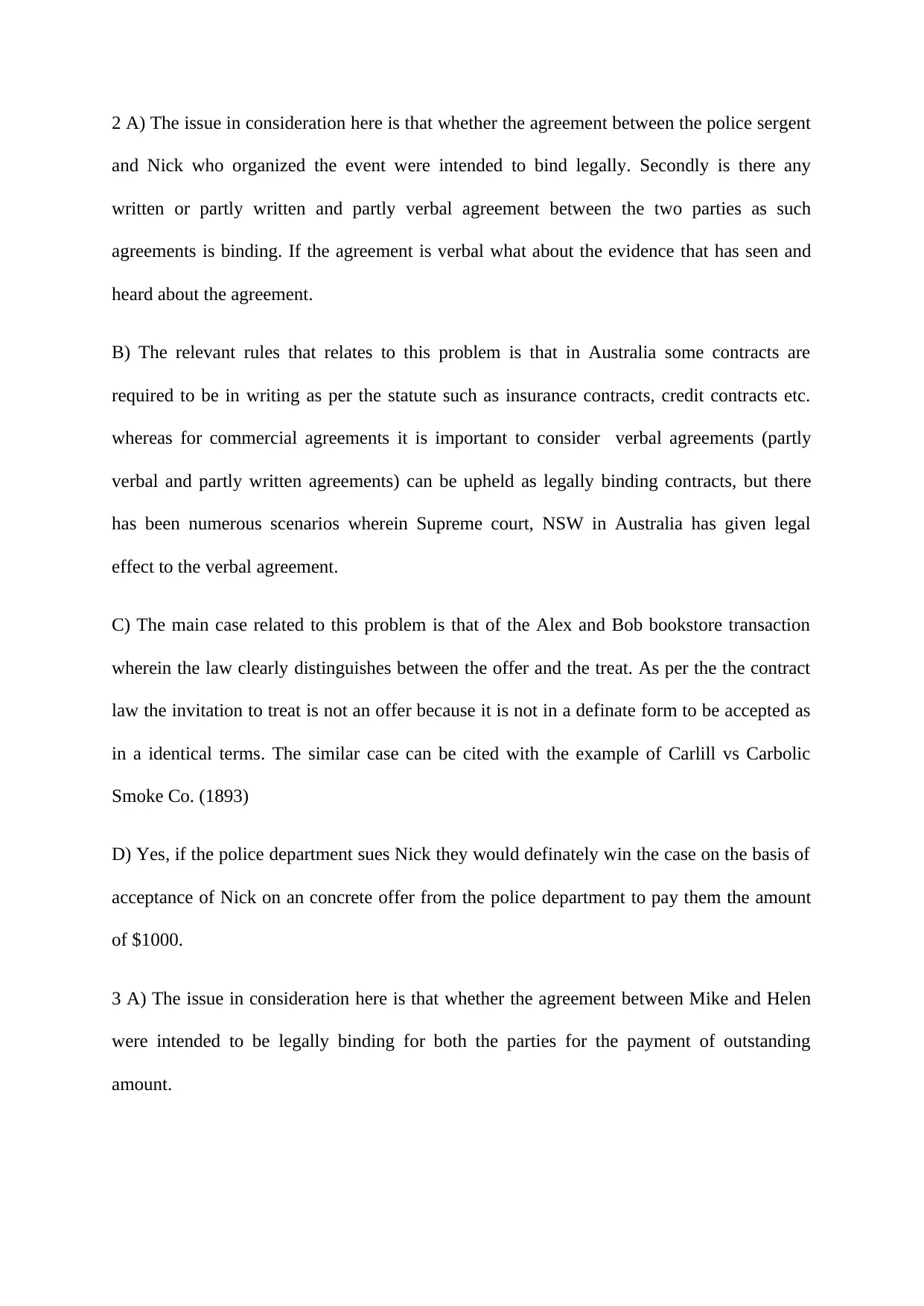
2 A) The issue in consideration here is that whether the agreement between the police sergent
and Nick who organized the event were intended to bind legally. Secondly is there any
written or partly written and partly verbal agreement between the two parties as such
agreements is binding. If the agreement is verbal what about the evidence that has seen and
heard about the agreement.
B) The relevant rules that relates to this problem is that in Australia some contracts are
required to be in writing as per the statute such as insurance contracts, credit contracts etc.
whereas for commercial agreements it is important to consider verbal agreements (partly
verbal and partly written agreements) can be upheld as legally binding contracts, but there
has been numerous scenarios wherein Supreme court, NSW in Australia has given legal
effect to the verbal agreement.
C) The main case related to this problem is that of the Alex and Bob bookstore transaction
wherein the law clearly distinguishes between the offer and the treat. As per the the contract
law the invitation to treat is not an offer because it is not in a definate form to be accepted as
in a identical terms. The similar case can be cited with the example of Carlill vs Carbolic
Smoke Co. (1893)
D) Yes, if the police department sues Nick they would definately win the case on the basis of
acceptance of Nick on an concrete offer from the police department to pay them the amount
of $1000.
3 A) The issue in consideration here is that whether the agreement between Mike and Helen
were intended to be legally binding for both the parties for the payment of outstanding
amount.
and Nick who organized the event were intended to bind legally. Secondly is there any
written or partly written and partly verbal agreement between the two parties as such
agreements is binding. If the agreement is verbal what about the evidence that has seen and
heard about the agreement.
B) The relevant rules that relates to this problem is that in Australia some contracts are
required to be in writing as per the statute such as insurance contracts, credit contracts etc.
whereas for commercial agreements it is important to consider verbal agreements (partly
verbal and partly written agreements) can be upheld as legally binding contracts, but there
has been numerous scenarios wherein Supreme court, NSW in Australia has given legal
effect to the verbal agreement.
C) The main case related to this problem is that of the Alex and Bob bookstore transaction
wherein the law clearly distinguishes between the offer and the treat. As per the the contract
law the invitation to treat is not an offer because it is not in a definate form to be accepted as
in a identical terms. The similar case can be cited with the example of Carlill vs Carbolic
Smoke Co. (1893)
D) Yes, if the police department sues Nick they would definately win the case on the basis of
acceptance of Nick on an concrete offer from the police department to pay them the amount
of $1000.
3 A) The issue in consideration here is that whether the agreement between Mike and Helen
were intended to be legally binding for both the parties for the payment of outstanding
amount.
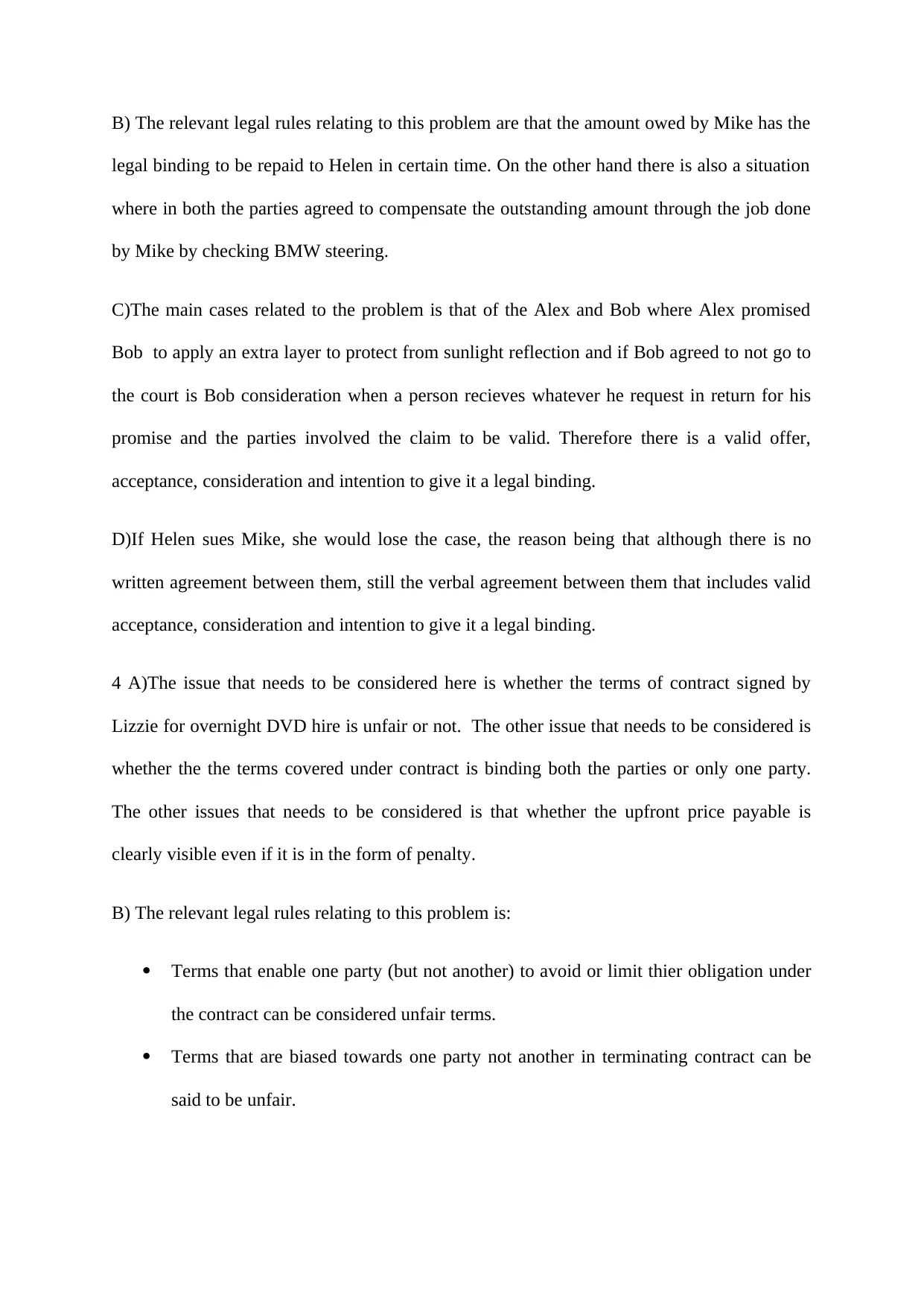
B) The relevant legal rules relating to this problem are that the amount owed by Mike has the
legal binding to be repaid to Helen in certain time. On the other hand there is also a situation
where in both the parties agreed to compensate the outstanding amount through the job done
by Mike by checking BMW steering.
C)The main cases related to the problem is that of the Alex and Bob where Alex promised
Bob to apply an extra layer to protect from sunlight reflection and if Bob agreed to not go to
the court is Bob consideration when a person recieves whatever he request in return for his
promise and the parties involved the claim to be valid. Therefore there is a valid offer,
acceptance, consideration and intention to give it a legal binding.
D)If Helen sues Mike, she would lose the case, the reason being that although there is no
written agreement between them, still the verbal agreement between them that includes valid
acceptance, consideration and intention to give it a legal binding.
4 A)The issue that needs to be considered here is whether the terms of contract signed by
Lizzie for overnight DVD hire is unfair or not. The other issue that needs to be considered is
whether the the terms covered under contract is binding both the parties or only one party.
The other issues that needs to be considered is that whether the upfront price payable is
clearly visible even if it is in the form of penalty.
B) The relevant legal rules relating to this problem is:
Terms that enable one party (but not another) to avoid or limit thier obligation under
the contract can be considered unfair terms.
Terms that are biased towards one party not another in terminating contract can be
said to be unfair.
legal binding to be repaid to Helen in certain time. On the other hand there is also a situation
where in both the parties agreed to compensate the outstanding amount through the job done
by Mike by checking BMW steering.
C)The main cases related to the problem is that of the Alex and Bob where Alex promised
Bob to apply an extra layer to protect from sunlight reflection and if Bob agreed to not go to
the court is Bob consideration when a person recieves whatever he request in return for his
promise and the parties involved the claim to be valid. Therefore there is a valid offer,
acceptance, consideration and intention to give it a legal binding.
D)If Helen sues Mike, she would lose the case, the reason being that although there is no
written agreement between them, still the verbal agreement between them that includes valid
acceptance, consideration and intention to give it a legal binding.
4 A)The issue that needs to be considered here is whether the terms of contract signed by
Lizzie for overnight DVD hire is unfair or not. The other issue that needs to be considered is
whether the the terms covered under contract is binding both the parties or only one party.
The other issues that needs to be considered is that whether the upfront price payable is
clearly visible even if it is in the form of penalty.
B) The relevant legal rules relating to this problem is:
Terms that enable one party (but not another) to avoid or limit thier obligation under
the contract can be considered unfair terms.
Terms that are biased towards one party not another in terminating contract can be
said to be unfair.
⊘ This is a preview!⊘
Do you want full access?
Subscribe today to unlock all pages.

Trusted by 1+ million students worldwide
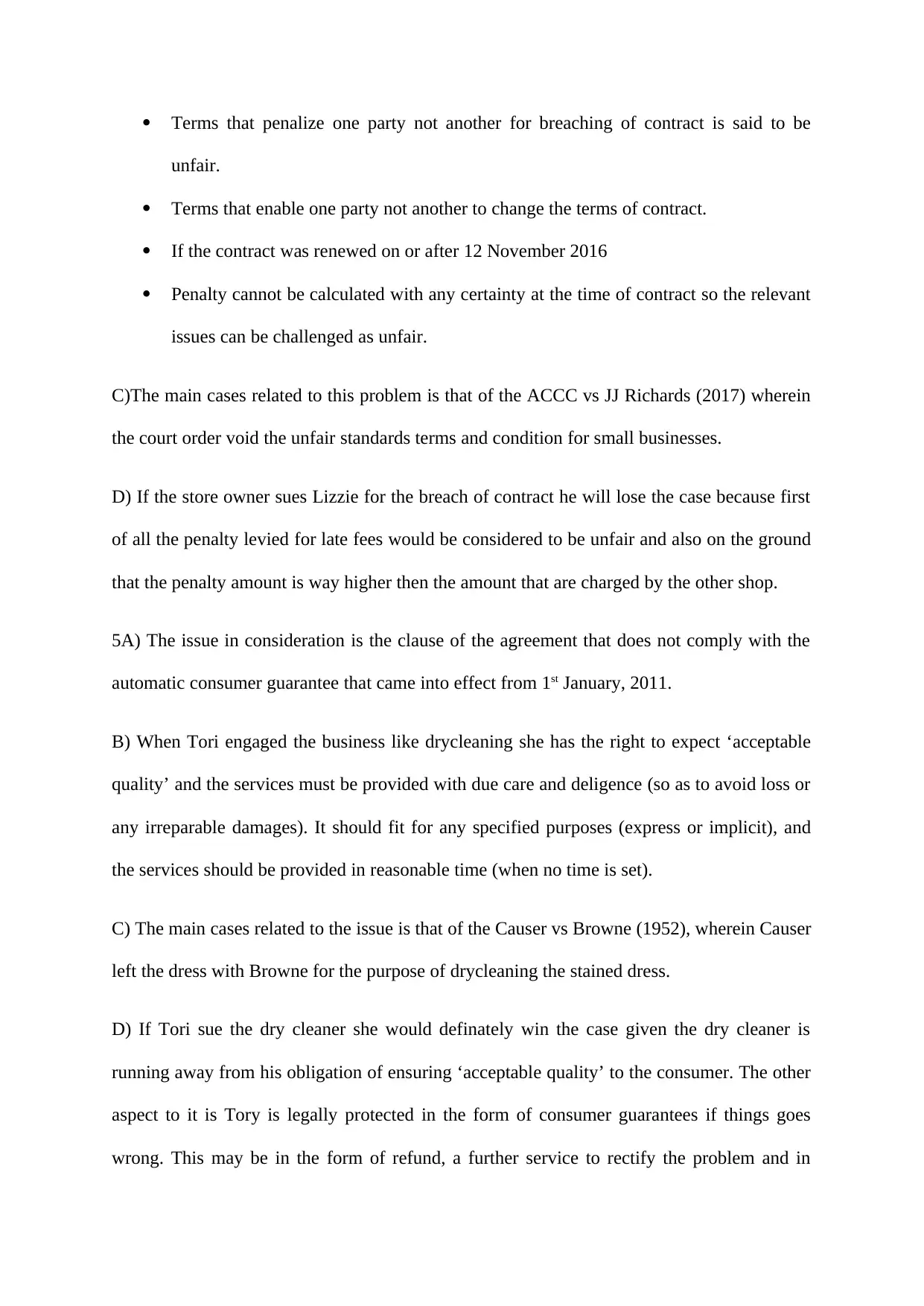
Terms that penalize one party not another for breaching of contract is said to be
unfair.
Terms that enable one party not another to change the terms of contract.
If the contract was renewed on or after 12 November 2016
Penalty cannot be calculated with any certainty at the time of contract so the relevant
issues can be challenged as unfair.
C)The main cases related to this problem is that of the ACCC vs JJ Richards (2017) wherein
the court order void the unfair standards terms and condition for small businesses.
D) If the store owner sues Lizzie for the breach of contract he will lose the case because first
of all the penalty levied for late fees would be considered to be unfair and also on the ground
that the penalty amount is way higher then the amount that are charged by the other shop.
5A) The issue in consideration is the clause of the agreement that does not comply with the
automatic consumer guarantee that came into effect from 1st January, 2011.
B) When Tori engaged the business like drycleaning she has the right to expect ‘acceptable
quality’ and the services must be provided with due care and deligence (so as to avoid loss or
any irreparable damages). It should fit for any specified purposes (express or implicit), and
the services should be provided in reasonable time (when no time is set).
C) The main cases related to the issue is that of the Causer vs Browne (1952), wherein Causer
left the dress with Browne for the purpose of drycleaning the stained dress.
D) If Tori sue the dry cleaner she would definately win the case given the dry cleaner is
running away from his obligation of ensuring ‘acceptable quality’ to the consumer. The other
aspect to it is Tory is legally protected in the form of consumer guarantees if things goes
wrong. This may be in the form of refund, a further service to rectify the problem and in
unfair.
Terms that enable one party not another to change the terms of contract.
If the contract was renewed on or after 12 November 2016
Penalty cannot be calculated with any certainty at the time of contract so the relevant
issues can be challenged as unfair.
C)The main cases related to this problem is that of the ACCC vs JJ Richards (2017) wherein
the court order void the unfair standards terms and condition for small businesses.
D) If the store owner sues Lizzie for the breach of contract he will lose the case because first
of all the penalty levied for late fees would be considered to be unfair and also on the ground
that the penalty amount is way higher then the amount that are charged by the other shop.
5A) The issue in consideration is the clause of the agreement that does not comply with the
automatic consumer guarantee that came into effect from 1st January, 2011.
B) When Tori engaged the business like drycleaning she has the right to expect ‘acceptable
quality’ and the services must be provided with due care and deligence (so as to avoid loss or
any irreparable damages). It should fit for any specified purposes (express or implicit), and
the services should be provided in reasonable time (when no time is set).
C) The main cases related to the issue is that of the Causer vs Browne (1952), wherein Causer
left the dress with Browne for the purpose of drycleaning the stained dress.
D) If Tori sue the dry cleaner she would definately win the case given the dry cleaner is
running away from his obligation of ensuring ‘acceptable quality’ to the consumer. The other
aspect to it is Tory is legally protected in the form of consumer guarantees if things goes
wrong. This may be in the form of refund, a further service to rectify the problem and in
Paraphrase This Document
Need a fresh take? Get an instant paraphrase of this document with our AI Paraphraser
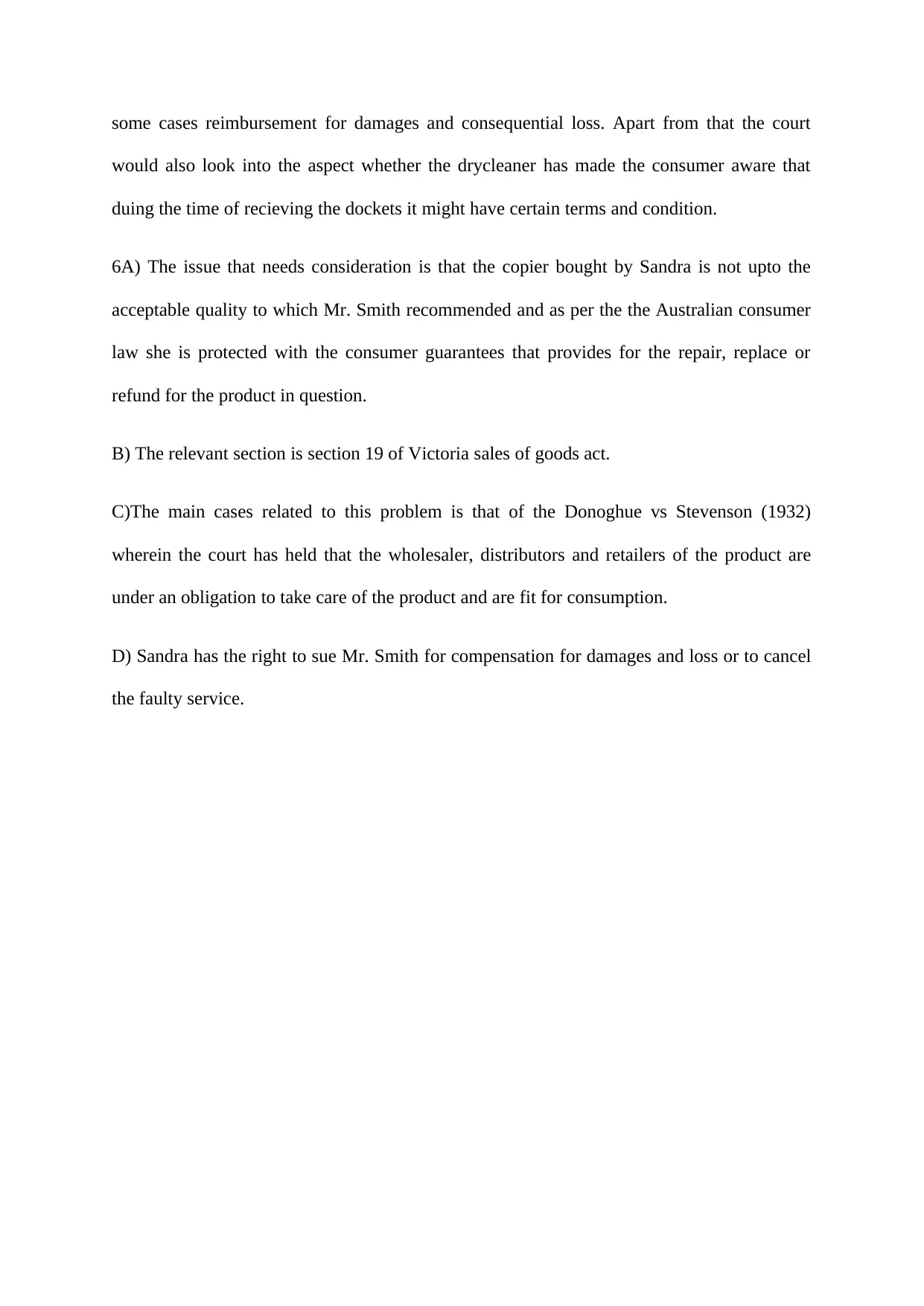
some cases reimbursement for damages and consequential loss. Apart from that the court
would also look into the aspect whether the drycleaner has made the consumer aware that
duing the time of recieving the dockets it might have certain terms and condition.
6A) The issue that needs consideration is that the copier bought by Sandra is not upto the
acceptable quality to which Mr. Smith recommended and as per the the Australian consumer
law she is protected with the consumer guarantees that provides for the repair, replace or
refund for the product in question.
B) The relevant section is section 19 of Victoria sales of goods act.
C)The main cases related to this problem is that of the Donoghue vs Stevenson (1932)
wherein the court has held that the wholesaler, distributors and retailers of the product are
under an obligation to take care of the product and are fit for consumption.
D) Sandra has the right to sue Mr. Smith for compensation for damages and loss or to cancel
the faulty service.
would also look into the aspect whether the drycleaner has made the consumer aware that
duing the time of recieving the dockets it might have certain terms and condition.
6A) The issue that needs consideration is that the copier bought by Sandra is not upto the
acceptable quality to which Mr. Smith recommended and as per the the Australian consumer
law she is protected with the consumer guarantees that provides for the repair, replace or
refund for the product in question.
B) The relevant section is section 19 of Victoria sales of goods act.
C)The main cases related to this problem is that of the Donoghue vs Stevenson (1932)
wherein the court has held that the wholesaler, distributors and retailers of the product are
under an obligation to take care of the product and are fit for consumption.
D) Sandra has the right to sue Mr. Smith for compensation for damages and loss or to cancel
the faulty service.
1 out of 5
Related Documents
Your All-in-One AI-Powered Toolkit for Academic Success.
+13062052269
info@desklib.com
Available 24*7 on WhatsApp / Email
![[object Object]](/_next/static/media/star-bottom.7253800d.svg)
Unlock your academic potential
Copyright © 2020–2026 A2Z Services. All Rights Reserved. Developed and managed by ZUCOL.


